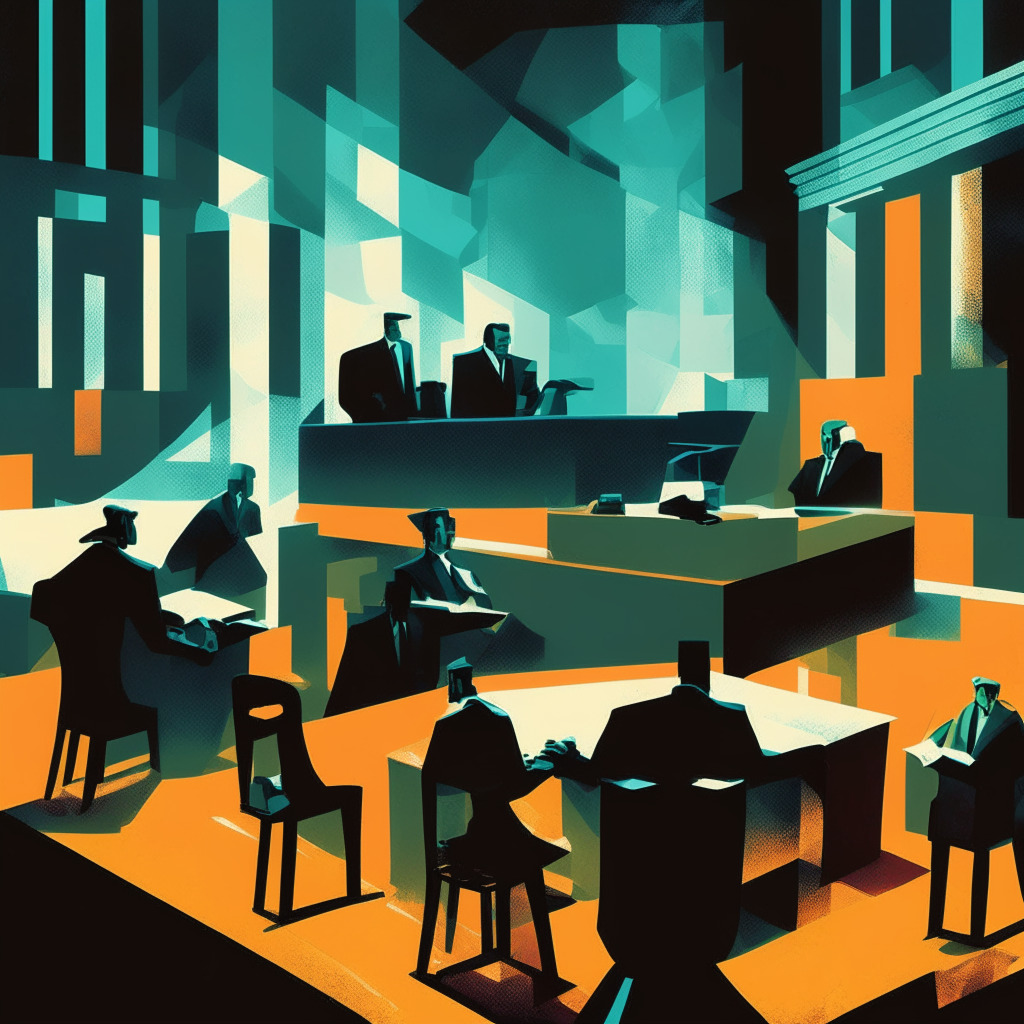“A federal appeals court, led by Circuit Judge Neomi Rao, mandated the U.S. Securities and Exchange Commission (SEC) review its decision to deny Grayscale Investments the right to convert its Grayscale Bitcoin Trust (GBTC) into an Exchange-Traded Fund (ETF). The victory raises questions over the public’s right to invest in cryptocurrency, and pushes against the SEC’s persistent resistance to Bitcoin ETFs. The cryptocurrency world continues to evolve rapidly, with a need for balance between access rights, safety, market volatility, and financial risks.”
Search Results for: Three Arrow Capital
BlockFi’s Redemption Saga: From ‘Trade Only’ Assets to Gemini Dollars and Patricia’s PTK Crisis
BlockFi’s saga continues as the company seeks court authorization to convert ‘trade only’ assets into stablecoins for user withdrawal. This move, supported by the Committee of BlockFi creditors, is part of efforts to return user funds. However, uncertainty remains due to debt and questionable plans. Similarly, Patricia crypto exchange faces skepticism over its debt token, Patricia Token (PTK). These situations highlight tension between trust, regulation, and innovation in the crypto world.
Crypto Giants BlockFi, FTX, and 3AC: A Tangled Web of Debts, Allegations, and Regulation Needs
This contentious dispute involves high-profile firms BlockFi, FTX, and Three Arrows Capital (3AC) in a bankruptcy case involving fraudulent allegation and massive debts amounting to hundreds of millions of dollars. The situation is created by BlockFi’s claims that its creditors should not be affected by FTX’s alleged risky behaviors and 3AC’s alleged fraud.
BlockFi’s Bankruptcy: A Tale of Turbulence, Recovery Efforts and Client Protection
Crypto lending firm, BlockFi, has faced financial turmoil and bankruptcy threats due to complications related to FTX-related matters. Despite the challenges, the firm remains committed to its clients, has undertaken a reorganization strategy to recoup funds, and strives for transparency in its ongoing hardships.
Dubai’s VARA Slaps $2.7 Million Fine on OPNX: A Call for Better Crypto Market Standards?
In a move to uphold industry standards, Dubai’s Virtual Assets Regulatory Authority (VARA) fined the co-founders of 3AC’s new crypto exchange venture, OPNX, $2.7m over a market offense. Absolution isn’t only debt-settling but respecting regulatory frameworks, with unpersistence risking further penalties and marketing the destination of the crypto ecosystem.
Dubai’s VARA Fines Crypto Bankruptcy Claims Exchange OPNX $2.8 Million: A Regulatory Cautionary Tale
Crypto bankruptcy claims exchange OPNX, led by founders of the defunct hedge fund Three Arrows Capital, faces a $2.8 million fine from the Virtual Assets Regulatory Authority of Dubai. This underscores the need for regulatory compliance in blockchain technology and digital asset ventures.
Singapore’s Legal Tug of War: Bankrupt Blockchain Hedge Fund vs Investment Firm
The legal dispute between bankrupt blockchain hedge fund, Three Arrows Capital, and DeFiance Capital, an investment firm, centers around the distribution of DeFiance’s assets. As per 3AC liquidators, these should be included in the 3AC bankruptcy estate for creditor distribution. However, DeFiance asserts that the assets should be divided among its investors. The conflict over assets, valued differently by each entity, reveals a discord on blockchain technology’s regulatory ambivalence and the determination of firms like DeFiance Capital to protect investor interests.
Coinbase Unveils Stand with Crypto Alliance: The Push for Unified Regulatory Clarity
Coinbase has launched Stand with Crypto Alliance, an independent non-profit seeking to advance the interests of the growing crypto community. Amid regulatory battles, this entity aims to rally the decentralized community towards legislation that shelters consumers and safeguards their crypto rights while fostering innovation. Coinbase’s move marks a significant shift towards legislative matters.
Unraveling Legal Complexities in Decentralized Finance: Case Study of 3AC’s Kyle Davies
This excerpt captures the key points of the article: “The court case involving Three Arrows Capital underscores the complex jurisdictive issues in regulating blockchain technology, particularly in cases involving non-US citizens. The incident illustrates the challenges regulators face when addressing decentralized technologies spanning transnational boundaries, highlighting the urgent demand for a global crypto law overhaul.”
Navigating the Regulatory Maze: Kyle Davies, PayPal and the Evolving Crypto Landscape
“Co-founder of Three Arrows Capital, Kyle Davies, avoided contempt charges in US Bankruptcy Court due to Singaporean citizenship. This development could impact the recovery efforts of liquidators seeking $1.3 billion from Davies. Meanwhile, PayPal’s new stablecoin PYUSD faces potential regulatory challenges, signaling a pivotal role of regulation in the future of cryptocurrencies.”
DCG and Gemini: Unraveling the Legal Brawl Shaping the Crypto Universe’s Future
The ongoing legal battle between Digital Currency Group (DCG) and Gemini centers around Gemini’s accusation that DCG provided misleading data concerning the financial health of Genesis, a DCG subsidiary. Gemini alleges that DCG’s false information led to Genesis’s billion-dollar financial shortfall and the collapse of its lending scheme, Gemini Earn. DCG defends that Gemini’s claims are misconstrued and aims for the lawsuit dismissal.
The LIBOR Lessons: What Cryptocurrency Can Learn from Past Financial Scandals
The transition from LIBOR to the Second Overnight Financing Rate highlights issues similar to those facing the crypto industry, including misconduct, corruption, and slow regulatory response. This shift has implications for crypto, like LIBOR, it enjoys minimal oversight over major players. With crypto’s rise as a top-performing asset, questions surface: Will crypto follow LIBOR’s path? Can the financial system include crypto in future reforms?
The SEC’s Covert Crusade Against US Crypto: Potential Collapse or Global Shift?
The U.S. Securities and Exchange Commission’s (SEC) changes in regulatory policies could be sabotaging the resurgence of the blockchain industry. The new rules, perceived by some as covert attempts to regulate crypto out of existence, have led to startups moving offshore and riskier investments for U.S. investors. The shift towards a more merit-based regulatory role by the SEC threatens to restrict financial open-source software and could disqualify operators like Fidelity Digital Assets from acting as custodians.
OPNX’s $30M Lifeline for Troubled Crypto Lender Hodlnaut: A Boon or a Road to Perdition?
Digital asset exchange OPNX is offering a $30 million lifeline to crypto lender Hodlnaut in the form of FLEX digital tokens, aiming to facilitate a partial creditor payout. However, regulatory scrutiny, especially from Dubai, could pose significant challenges to this rescue plan. With network’s financial status hanging in the balance, final outcomes remain uncertain for now.
The Troubled Future of Hodlnaut: Lifeline or Death Knell through OPNX’s Crypto Takeover Bid?
OPNX exchange has initiated a bid to acquire 75% of Singaporean cryptocurrency lender Hodlnaut, with a proposal to infuse $30 million in FLEX tokens. While this could help alleviate bankruptcy and credit payout issues, there’s scepticism about whether creditors will accept the deal.
Coinbase’s Trading Slump: A Sombre Wave or the Calm Before a Strong Rally?
“Leading U.S. crypto exchange Coinbase reveals a 70% drop in consumer trading volume due to decreasing market capitalization of cryptocurrencies, stable Bitcoin prices, and less opportunities for significant returns. Despite regulatory scrutiny and downtrend, Coinbase maintains an optimistic outlook, backed by reported increased Q2 revenue and reduced losses.”
BlockFi’s Bankruptcy Plan: A Beacon of Hope or Injustice in Disguise?
BlockFi’s bankruptcy reorganization continues with a disclosed goal to speed up creditor recoveries. Despite criticisms suggesting their plan lacks procedural fairness, the firm is optimistic. The deciding vote on their reorganization progress is forthcoming on September 11.
Navigating Borderless Blockchain: The Dual Life of A Bankrupt Crypto-Titan
Kyle Davies, co-founder of the bankrupt cryptocurrency hedge fund Three Arrows Capital, asserts immunity from U.S courts due to his Singaporean citizenship. Amidst court proceedings, Davies and co-founder Su Zhu allegedly pursued leverage despite insolvency, creating a $3.5 billion deficit. Meanwhile, they enjoyed luxuries in Bali, even starting a new project—a crypto exchange for trading bankruptcy claims.
Navigating the Controversy: Worldcoin’s Retinal Scans Stir up Crypto Scepticism and Safety Debates
Worldcoin, a project aiming to authenticate users via retinal scans for a global digital currency, faces scrutiny over its biometric data collection methods from various European authorities concerned about potential user risk. Amidst this flak, Worldcoin is still attracting significant interest, exemplifying the ongoing conflict between fostering innovative growth and ensuring security in the crypto space.
Tether’s Rising Treasury Reserves: A Balancing Act between Expansion and Security
“Tether recently disclosed a Q2 attestation, revealing a $3.3 billion jump in its excess reserves. Despite raising market concerns due to increasing U.S. Treasury bill holdings, Tether maintains 100% reserves for USDT tokens and continues growing financially. Transparency around reinvested profits becomes key to investor confidence.”
Bankruptcy and Blockchain: FTX Vs Genesis Case Study & Its Impact on Crypto Regulation
The recent bankruptcy settlement between FTX exchange and Genesis crypto lender has sparked numerous conversations about the financial implications of blockchain technology and its regulations. This case highlights the need for a stronger, transparent regulatory framework for cryptocurrencies to ensure fair play whilst encouraging innovation.
Blockbuster Crypto Settlement: Analyzing the FTX and Genesis Agreement Saga
Crypto firms FTX and Genesis may settle their agreement in ongoing Chapter 11 bankruptcy cases, potentially resolving their conflicting claims. This case reveals the volatile nature of the blockchain industry, emphasizing the need for sound legal and financial practices in crypto transactions.
Worldcoin’s Future: Privacy Concerns, Dubious Investors and Potentially Revolutionary Tech
The Worldcoin project, co-founded by OpenAI’s Sam Altman, uses a hardware unit called the Orb for identity verification by iris scanning. Despite initial success, criticism has piled up around privacy, centralization, security concerns, and questionable marketing strategies. Ethereum co-founder, Vitalik Buterin and crypto influencer ZachXBT have voiced concerns about potential misuse and exploitation.
Unveiling the Fir Tree’s Digital Asset Opportunities Fund: Turning Crypto Turmoil into Dividends
New York hedge fund, Fir Tree Partners, is launching the Fir Tree Digital Asset Opportunities Fund to capitalize on opportunities within the complex digital asset markets. The move, set for August 1, comes despite the firm’s history of risky crypto engagements and the notable risks associated with investing in distressed assets.
The Emergence of OPNX: A Symbiosis of Traditional Finance and Crypto Trading
“OPNX, an exchange dedicated to trading bankruptcy claims against collapsed crypto firms, merges traditional financial structures with new-age cryptocurrencies. It allows claims to be converted into collateral to trade crypto futures, adding a unique dimension to crypto trading.”
Navigating Crypto Bankruptcy with OPNX: A Glimmer of Hope or Risky Venture?
Open Exchange (OPNX) is offering beleaguered investors, from the collapse of crypto exchange FTX and lender Celsius Network, a chance to trade their claims on their platform. With claim tokenization, this offers an opportunity for immediate liquidity and control over their funds.
BitOasis Operational License Halted: Ripple Effects in Dubai’s Crypto Market
The Virtual Assets Regulatory Authority (VARA) has suspended the license of BitOasis, the first crypto exchange in Dubai, for not meeting key regulatory conditions. This incident, along with previous ones involving unlicensed operations, showcases Dubai’s complex journey towards incorporating cryptocurrencies in its economic landscape.
From Bankruptcy to Revival: The Resilience and Struggles of Crypto Lender Voyager Digital
“Voyager Digital, a once bankrupt crypto lender, has witnessed over $250 million outflow since reinstating withdrawals on June 23rd. Despite complications and previous bankruptcy proceedings, current data sets the platform’s total holdings at $176 million in various cryptocurrencies, with an impressive Clean Asset ratio of 96.15%.”
High-Stakes Blame Game: The Winklevoss-DCG Legal Battles and the Future of Crypto Regulations
Digital Currency Group (DCG) and Gemini are involved in a complex legal dispute over allegations of deceit and insolvency. The lawsuit underlines the need for transparency and robust safeguards in the evolving world of blockchain and cryptocurrency transactions.
Billion-Dollar Storm: How Crypto Giants 3AC, DCG, and BlockFi Navigate Liquidation Claims
“The liquidator of Three Arrows Capital, 3AC, may recover $1.2 billion from the Digital Currency Group, DCG, and BlockFi. Claims may involve issues surrounding loan and security documentation, potentially hinting at transactions during a period known as the insolvency twilight zone. The future of cryptocurrency must ensure transparency to prevent such situations.”
Gemini versus Digital Currency Group: The Billion-Dollar Lawsuit Shaking Up the Crypto Sphere
The Winklevoss twins’ Gemini crypto exchange is suing the Digital Currency Group (DCG) and its CEO for alleged deceitful practices that resulted in a financial void for Gemini. The lawsuit suggests DCG’s subsidiary Genesis persisted with a lending program despite nearing insolvency, resulting in Gemini’s considerable asset loss,
Gemini Vs Genesis: A Tale of Trust, Transparency and Regulatory Challenges in Crypto Sphere
“The Gemini-Genesis incident emphasizes transparency importance in crypto financial transactions and exposes vulnerabilities in the current regulatory framework. This reflects the balancing act between progressing financial freedom and respecting monetary regulations in a world where the stakes are high.”






























